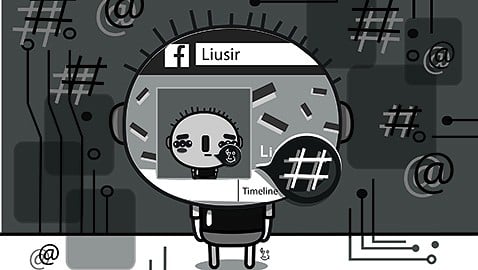Users’ obsession with social media has negatively impacted the way they perceive themselves and others
Posting on Twitter, Facebook or Instagram is no easy feat. Crafting the perfect post takes time and a good amount of mental effort and attention. People think long and hard about how their post looks to their “friends” or followers and make subsequent alterations to the original status idea they had or picture that they took.
This shift towards the blending of social interaction and the digital media revolution is creating a divide between our real-life social personas and how we present ourselves online. The millennial generation is supposedly the most self-obsessed group of young people to date, simply because the era of living with one foot in the digital world has made them want to represent the best version of themselves. It is no longer acceptable to just be average; the new norm is to enhance digital outputs in some way before sending them off into the world. Every blemish must be edited away, poses must be made to highlight a person’s best features and a picture ought to receive a certain number of likes for the poster to be considered popular. The staggering effort put into even the simplest pictures should lead society to examine its use of social media with a critical eye.
People try to create a perfect depiction of themselves, with flaws being turned into harmless jokes. Take, for example, something like a Twitter bio. It is the perfect opportunity for an average Joe to, in the words of the New York Times reporter Teddy Wayne, “cleverly synopsize one’s professional and personal accomplishments, along with a carefully edited non sequitur or two. It lets the famous and the anonymous, athletes, accountants and suburban dads alike demonstrate that they are special snowflakes with Wes Anderson-worthy quirks” in 160 characters. It is a fantastic excuse to nonchalantly flaunt personal best traits and promote successes. In turn, social network newcomers peruse the bios or profiles of existing users and after seeing how impeccable they look, proceed to create similar ones for themselves. Hence, it becomes a self-perpetuating loop.
While social media users should not be reprimanded for attempting to put their best selves forward, their attempts for sheer perfection are troubling. According to Forbes, “almost a quarter of Americans say that they’ve missed out on important life moments in their quest to capture and memorialize them for social media.” Instead of enjoying a night out with friends, too many Instagram addicts are absorbed in making the perfect Pic Stitch. This is not to say that people should only share everything in its original form on social networks, but this obsession with a polished image communicates a deeper message about the direction society is moving in.
A happy picture of two friends that comes off as candid could, in fact, have been manipulated and staged, retaken a few times and then edited to whatever the poster’s standards of an acceptable public photograph are. With the touch of a finger, a picture can be filtered from mediocre to hip and artsy in an attempt to collect more likes.
People have become increasingly more dependent on getting validation from others in the social media arena, in the form of things like likes, retweets, and comments. A common goal for some Facebook users is to receive 100 plus likes on their profile pictures, and the quality of a status update is usually judged by how many comments, likes and shares it has.
But the problem is that when an acceptable number of likes is not achieved, people tend to feel like they are lacking. A recent study conducted on college-age students at the University of Michigan concluded that “the more [the students] used Facebook, the worse they felt. The study … found Facebook use led to declines in moment-to-moment happiness and overall life satisfaction.”
This whole effect makes people feel more vulnerable to the opinions and online actions of their networks.
The shift in recent use of social networks has created negative consequences that are changing the way people view themselves and others. While the way society currently uses social media shows a lack of intimacy and honesty, perhaps it is not too late to remedy the situation. It is time to reevaluate the amount of time and emotion that social media leeches and to eschew the copious amounts of deliberation and editing in favor of a more truthful depiction of ourselves.













Heather • Nov 11, 2013 at 9:44 pm
I really needed to discuss this blog post, “All About Me |” with my
good friends on facebook or twitter. I actuallybasically planned to pass on
your wonderful posting! Thx, Bertha